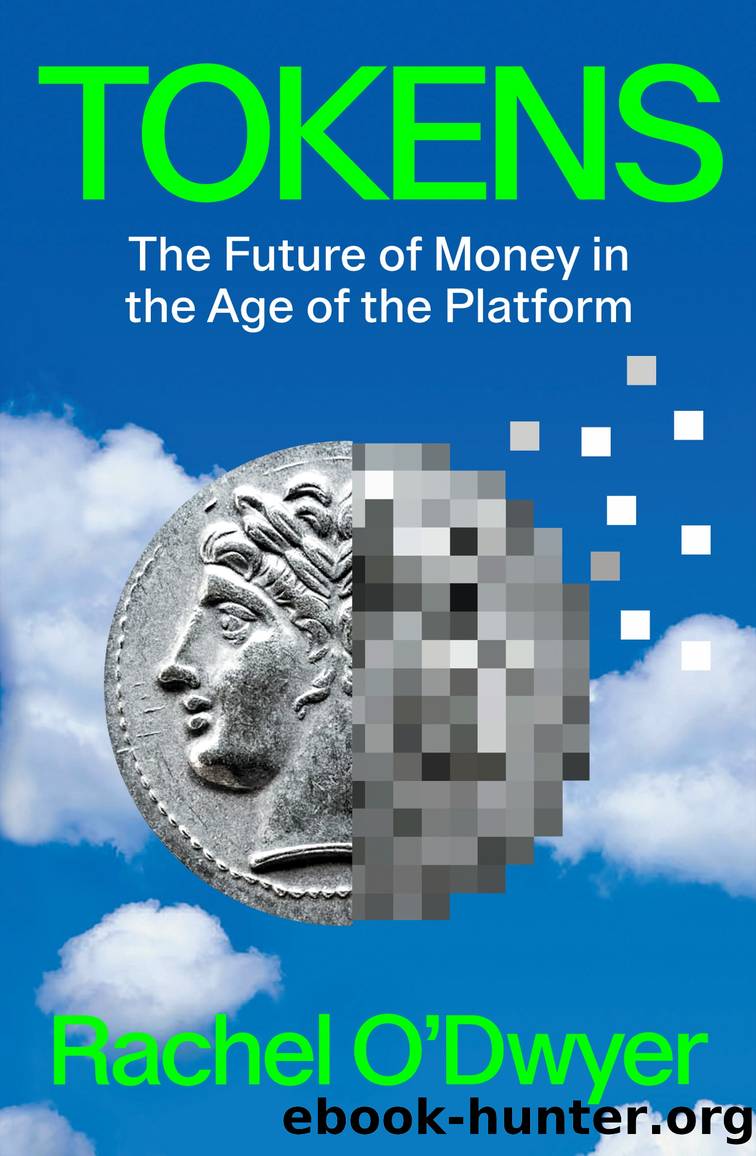Tokens by Rachel O'Dwyer

Author:Rachel O'Dwyer
Language: eng
Format: epub
Publisher: Verso Books
The Cypherpunks were influenced by books such as The Machinery of Freedom, by David Friedman (son of Milton), an anarcho-capitalist text arguing that law should be switched out for technological solutions, and William Rees-Mogg and James Dale Davisonâs The Sovereign Individual, which forecast a shift from the nation-state to entrepreneurial governance, in which shareholder votes and contracts (not unlike Weylâs quadratic voting, in fact) would replace the democratic process.22 The group wanted to replace politics with a neat, automated solution. Anarchy, in the words of the Cypherpunk glossary, was âa technological solution to the problem of too much governmentâ.23 Anarchy, May wrote, had a bad reputation because it was most often associated with chaos and an absence of control, but here it signified an â âabsence of governmentâ (literally, âan arch,â without a chief or a head)â.24 It was rules without rulers. Chop off the head, but replace it with the right protocol.
The Cypherpunks favoured technological solutions over human politics. âIndividual liberty can be assured by something more reliable than manmade laws,â May argued, sounding a lot like a Winklevoss twin â âthe unflinching rules of math and physics.â25 Politics would not bring freedom, but computation might. The Cypherpunk group tended to quash political wrangling (although there was still plenty of it happening on the list). Threads on the philosophy of libertarianism were shut down with an invocation of founder Eric Hughesâs maxim: âCypherpunks write codeâ. In the words of one member, âtechnology ⦠was more important and interesting than yet more gabbing about liberty and privacyâ.26 âCypherpunks write codeâ was a motto, but it was also a universal putdown when arguments got too boring or complex â a geekâs variation on âIf youâre so smart, why ainât you rich?â And yet, it was through this sort of debate that many of the core technical and philosophical ideas that would later become Bitcoin were first teased out.
Hal Finney shared a reusable proof-of-work â a system, initially designed to mitigate email spam, that was later repurposed to ensure the trustworthiness of a shared database. Finney suggested the creation of encrypted tokens using proof-of-work.27 In 1994, Nick Szabo posted his seminal work on smart contracts â self-executing agreements that used cryptography rather than legal mechanisms to ensure compliance. Such contracts would work not because of the threat of external coercion by the state (as in the legal system), and not because the parties involved knew or trusted one another (as in the kin-communal systems of the Irish bank strikes), but simply because the contracting parties trusted in the technology to execute the contract.28 âYou trust the thing because of the way it behaves, not because you trust the people who gave you access to itâ, wrote Robert (Bob) Hettinga to the forum.29 It was not that these systems could complement a broader political process, but that they might replace it altogether â that technology could, in itself, remake the social. As Eric Hughes put it in his statement of purpose for the Cypherpunk list, âcryptographic protocols make social structuresâ.
Download
This site does not store any files on its server. We only index and link to content provided by other sites. Please contact the content providers to delete copyright contents if any and email us, we'll remove relevant links or contents immediately.
International Integration of the Brazilian Economy by Elias C. Grivoyannis(111057)
The Radium Girls by Kate Moore(12026)
Turbulence by E. J. Noyes(8047)
Nudge - Improving Decisions about Health, Wealth, and Happiness by Thaler Sunstein(7706)
The Black Swan by Nassim Nicholas Taleb(7128)
Rich Dad Poor Dad by Robert T. Kiyosaki(6632)
Pioneering Portfolio Management by David F. Swensen(6300)
Man-made Catastrophes and Risk Information Concealment by Dmitry Chernov & Didier Sornette(6019)
Zero to One by Peter Thiel(5800)
Secrecy World by Jake Bernstein(4751)
Millionaire: The Philanderer, Gambler, and Duelist Who Invented Modern Finance by Janet Gleeson(4478)
The Age of Surveillance Capitalism by Shoshana Zuboff(4291)
Skin in the Game by Nassim Nicholas Taleb(4248)
The Money Culture by Michael Lewis(4207)
Bullshit Jobs by David Graeber(4190)
Skin in the Game: Hidden Asymmetries in Daily Life by Nassim Nicholas Taleb(4004)
The Dhandho Investor by Mohnish Pabrai(3764)
The Wisdom of Finance by Mihir Desai(3746)
Blockchain Basics by Daniel Drescher(3581)
